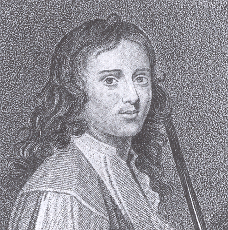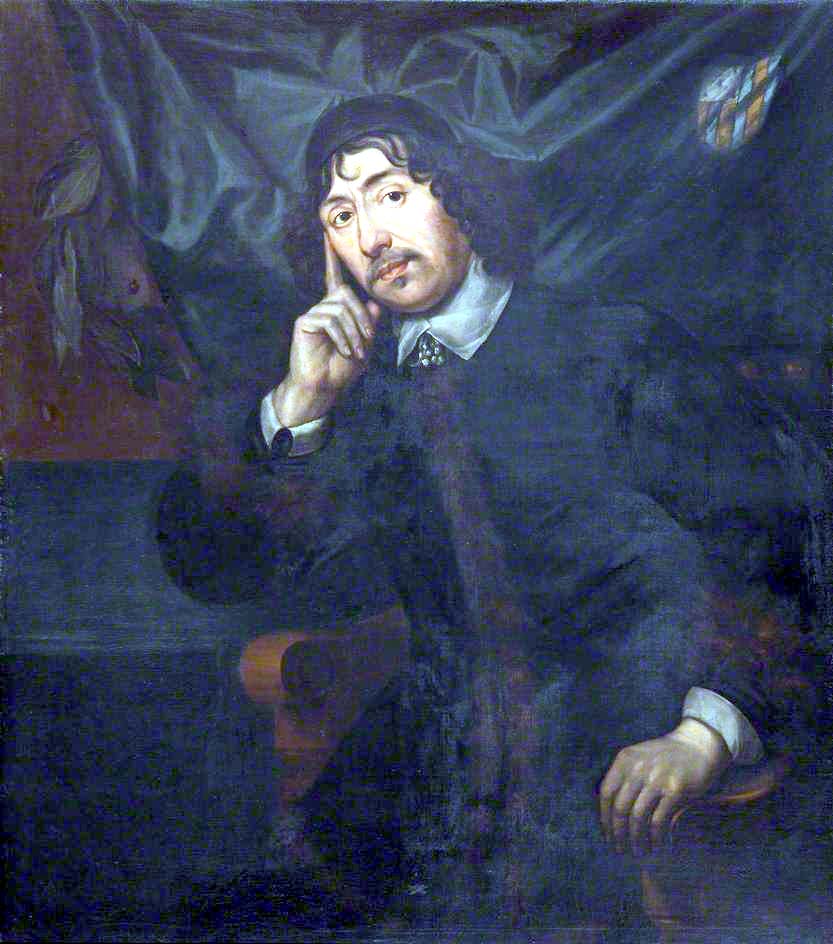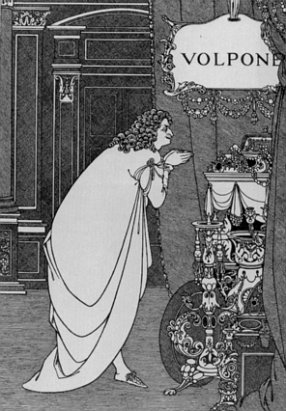|
Michael Mohun
Michael Mohun (1616? – buried 11 October 1684) was a leading English actor both before and after the 1642–60 closing of the theatres. Mohun began his stage career as a boy player filling female roles; he was part of Christopher Beeston's theatrical establishment at the Cockpit Theatre, "eventually becoming a key member of Queen Henrietta's Men." For the period from 1642 to 1659, Mohun was an officer in military units loyal to the House of Stuart; he served in England, Ireland, and the Low Countries, and rose to the rank of major. He was seriously wounded at Dublin, and was a prisoner of war for two extended periods. At the end of the English Interregnum, Mohun was one of the men — George Jolly and John Rhodes were others — who attempted to restart dramatic performance. In 1659 Mohun performed with other pre-Commonwealth actors in an unlicensed troupe at the Red Bull Theatre. As the manager of the troupe, Mohun came to an agreement with the Master of the Revels ... [...More Info...] [...Related Items...] OR: [Wikipedia] [Google] [Baidu] |
English Restoration
The Restoration of the Stuart monarchy in the kingdoms of England, Scotland and Ireland took place in 1660 when King Charles II returned from exile in continental Europe. The preceding period of the Protectorate and the civil wars came to be known as the Interregnum (1649–1660). The term ''Restoration'' is also used to describe the period of several years after, in which a new political settlement was established. It is very often used to cover the whole reign of King Charles II (1660–1685) and often the brief reign of his younger brother King James II (1685–1688). In certain contexts it may be used to cover the whole period of the later Stuart monarchs as far as the death of Queen Anne and the accession of the Hanoverian King George I in 1714. For example, Restoration comedy typically encompasses works written as late as 1710. The Protectorate After Richard Cromwell, Lord Protector from 1658 to 1659, ceded power to the Rump Parliament, Charles Fleetwood an ... [...More Info...] [...Related Items...] OR: [Wikipedia] [Google] [Baidu] |
Rule A Wife And Have A Wife
''Rule a Wife and Have a Wife'' is a late Jacobean stage comedy written by John Fletcher. It was first performed in 1624 and first published in 1640. It is a comedy with intrigue that tells the story of two couples that get married with false pretenses. The play was licensed for performance by Sir Henry Herbert, the Master of the Revels, on 19 October 1624. It was performed by the King's Men, who performed it at Court twice in that season. The 1640 quarto was printed at Oxford by Leonard Lichfield, the printer to the University of Oxford. It was later reprinted in the second Beaumont and Fletcher folio of 1679. It was revived in the Restoration era in an adaptation, like many of Fletcher's plays; the revised version was printed in 1697 and repeatedly thereafter, and proved to be among the dramatist's most popular works. External evidence, including Herbert's entry in his records and the 1640 quarto, assigns the play to Fletcher alone. The play's internal evidence of sty ... [...More Info...] [...Related Items...] OR: [Wikipedia] [Google] [Baidu] |
The Humorous Lieutenant
''The Humorous Lieutenant'', also known as ''The Noble Enemies'', ''Demetrius and Enanthe'', or ''Alexander's Successors'', is a Jacobean era stage play, a tragicomedy written by John Fletcher. Highly praised by critics, it has been called "Fletcher's best comedy." The drama was initially published in the first Beaumont and Fletcher folio of 1647. Date and performance The second Beaumont/Fletcher folio of 1679 provides a cast list for the original King's Men's production, which includes Henry Condell, Joseph Taylor, John Lowin, William Ecclestone, Richard Sharpe, John Underwood, Robert Benfield—and Thomas Pollard, the comic actor who filled the title role. This is the only cast list that includes both Taylor and Condell; Taylor joined the company in the spring of 1619, to replace Richard Burbage after his death in March of that year; and Condell is thought to have retired not long after—which appears to date the play fairly securely to 1619. Manuscript In addition to ... [...More Info...] [...Related Items...] OR: [Wikipedia] [Google] [Baidu] |
The Alchemist (play)
''The Alchemist'' is a comedy by English playwright Ben Jonson. First performed in 1610 by the King's Men, it is generally considered Jonson's best and most characteristic comedy; Samuel Taylor Coleridge believed that it had one of the three most perfect plots in literature. The play's clever fulfilment of the classical unities and vivid depiction of human folly have made it one of the few Renaissance plays (except the works of Shakespeare) with a continuing life on stage, apart from a period of neglect during the Victorian era. Background ''The Alchemist'' premiered 34 years after the first permanent public theatre ( The Theatre) opened in London; it is, then, a product of the early maturity of commercial drama in London. Only one of the University Wits who had transformed drama in the Elizabethan period remained alive (this was Thomas Lodge); in the other direction, the last great playwright to flourish before the Interregnum, James Shirley, was already a teenager. The the ... [...More Info...] [...Related Items...] OR: [Wikipedia] [Google] [Baidu] |
Love's Cruelty
''Love's Cruelty'' is a Caroline-era stage play, a tragedy written by James Shirley, and first published in 1640. The play was licensed for performance by Sir Henry Herbert, the Master of the Revels, on 14 November 1631. Like the majority of Shirley's dramas, it was acted by Queen Henrietta's Men at the Cockpit Theatre. The play was entered into the Stationers' Register on 25 April 1639 by the booksellers Andrew Crooke and William Cooke, along with three other Shirley plays. (The three were ''The Opportunity,'' '' The Coronation,'' and ''The Night Walker.'') The play was published the next year, in a quarto printed by Thomas Cotes — though only Andrew Crooke's name is on the title page. Shirley based his plot on material from two sources: novel 36 of the '' Heptameron'' of Marguerite of Navarre, and novel 6, decade 3, of the ''Hecatomithi'' of Cinthio. Shirley may have accessed Marguerite's tale in English translation in ''The Palace of Pleasure'' by William Painter. Sh ... [...More Info...] [...Related Items...] OR: [Wikipedia] [Google] [Baidu] |
James Shirley
James Shirley (or Sherley) (September 1596 – October 1666) was an English dramatist. He belonged to the great period of English dramatic literature, but, in Charles Lamb's words, he "claims a place among the worthies of this period, not so much for any transcendent genius in himself, as that he was the last of a great race, all of whom spoke nearly the same language and had a set of moral feelings and notions in common." His career of play writing extended from 1625 to the suppression of stage plays by Parliament in 1642. Biography Early life Shirley was born in London and was descended from the Shirleys of Warwick, the oldest knighted family in Warwickshire. He was educated at Merchant Taylors' School, London, St John's College, Oxford, and St Catharine's College, Cambridge, where he took his BA degree in or before 1618. His first poem, ''Echo, or the Unfortunate Lovers'' was published in 1618; no copy of it is known, but it is probably the same as 1646's ''Narcissus' ... [...More Info...] [...Related Items...] OR: [Wikipedia] [Google] [Baidu] |
The Country Wife
''The Country Wife'' is a Restoration comedy written by William Wycherley and first performed in 1675. A product of the tolerant early Restoration period, the play reflects an aristocratic and anti-Puritan ideology, and was controversial for its sexual explicitness even in its own time. The title contains a lewd pun with regard to the first syllable of "country". It is based on several plays by Molière, with added features that 1670s London audiences demanded: colloquial prose dialogue in place of Molière's verse, a complicated, fast-paced plot tangle, and many sex jokes. It turns on two indelicate plot devices: a rake's trick of pretending impotence to safely have clandestine affairs with married women, and the arrival in London of an inexperienced young "country wife", with her discovery of the joys of town life, especially the fascinating London men. The implied condition the Rake, Horner, claimed to suffer from was, he said, contracted in France whilst "dealing with ... [...More Info...] [...Related Items...] OR: [Wikipedia] [Google] [Baidu] |
William Wycherley
William Wycherley (baptised 8 April 16411 January 1716) was an English dramatist of the Restoration period, best known for the plays ''The Country Wife'' and ''The Plain Dealer''. Early life Wycherley was born at Clive near Shrewsbury, Shropshire, although his birthplace has been said to be Trench Farm to the north near Wem later the birthplace of another writer, John Ireland, who was said to have been adopted by Wycherley's widow following the death of Ireland's parents. He was baptised on 8 April 1641 at Whitchurch, Hampshire, son of Daniel Wycherley (1617–1697) and his wife Bethia, daughter of William Shrimpton. His family was settled on a moderate estate of about £600 a year and his father was in the business service of the Marquess of Winchester. Wycherley lived during much of his childhood at Trench Farm, one his paternal family's properties, then spent some three years of his adolescence in France, where he was sent, at fifteen, to be educated on the banks of the Char ... [...More Info...] [...Related Items...] OR: [Wikipedia] [Google] [Baidu] |
Volpone
''Volpone'' (, Italian for "sly fox") is a comedy play by English playwright Ben Jonson first produced in 1605–1606, drawing on elements of city comedy and beast fable. A merciless satire of greed and lust, it remains Jonson's most-performed play, and it is ranked among the finest Jacobean era comedies. Characters * Volpone (the Sly Fox) – a greedy and rich childless Venetian ''magnifico'' * Mosca (the Fly) – his servant * Voltore (the Vulture) – a lawyer * Corbaccio (the Raven) – an avaricious old miser * Bonario – Corbaccio's son * Corvino (the Carrion Crow) – a merchant * Celia – Corvino's wife * Sir Politic Would-Be – ridiculous Englishman * Lady Would-Be (the parrot) – English lady and wife of Sir Politic-Would-Be * Peregrine ("Pilgrim") – another, more sophisticated, English traveller * Nano – a dwarf, companion of Volpone * Androgyno – a hermaphrodite, companion of Volpone * Castrone – a eunuch, companion of Volpone * The Avocatori – the ... [...More Info...] [...Related Items...] OR: [Wikipedia] [Google] [Baidu] |
Ben Jonson
Benjamin "Ben" Jonson (c. 11 June 1572 – c. 16 August 1637) was an English playwright and poet. Jonson's artistry exerted a lasting influence upon English poetry and stage comedy. He popularised the comedy of humours; he is best known for the satirical plays '' Every Man in His Humour'' (1598), '' Volpone, or The Fox'' (c. 1606), '' The Alchemist'' (1610) and '' Bartholomew Fair'' (1614) and for his lyric and epigrammatic poetry. "He is generally regarded as the second most important English dramatist, after William Shakespeare, during the reign of James I." Jonson was a classically educated, well-read and cultured man of the English Renaissance with an appetite for controversy (personal and political, artistic and intellectual) whose cultural influence was of unparalleled breadth upon the playwrights and the poets of the Jacobean era (1603–1625) and of the Caroline era (1625–1642)."Ben Jonson", ''Grolier Encyclopedia of Knowledge'', volume 10, p. 388. His ancest ... [...More Info...] [...Related Items...] OR: [Wikipedia] [Google] [Baidu] |






